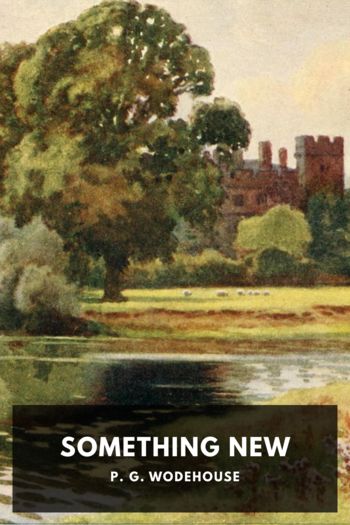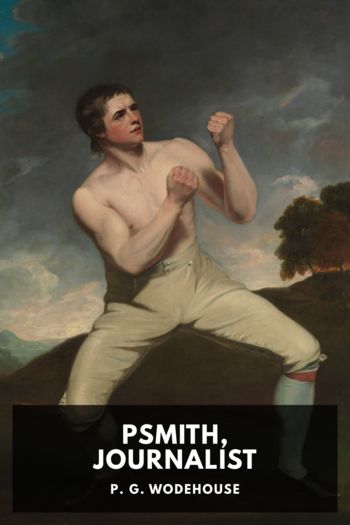Leave It to Psmith - P. G. Wodehouse (i wanna iguana read aloud .TXT) 📗

- Author: P. G. Wodehouse
Book online «Leave It to Psmith - P. G. Wodehouse (i wanna iguana read aloud .TXT) 📗». Author P. G. Wodehouse
“You desire,” said Beach, feeling his way cautiously, “a small cottage where you can write poetry, sir?”
“You follow me like a leopard. Do you know of such a one?”
“There is an unoccupied gamekeeper’s cottage in the west wood, sir, but it is an extremely humble place.”
“Be it never so humble, it will do for me. Do you think Lady Constance would be offended if I were to ask for the loan of it for a few days?”
“I fancy that her ladyship would receive the request with equanimity, sir. She is used to … She is not unaccustomed … Well, I can only say, sir, that there was a literary gentleman visiting the castle last summer who expressed a desire to take sun-baths in the garden each morning before breakfast. In the nood, sir. And, beyond instructing me to warn the maids, her ladyship placed no obstacle in the way of the fulfilment of his wishes. So …”
“So a modest request like mine isn’t likely to cause a heart-attack? Admirable! You don’t know what it means to me to feel that I shall soon have a little refuge of my own, to which I can retreat and be in solitude.”
“I can imagine that it must be extremely gratifying, sir.”
“Then I will put the motion before the Board directly Lady Constance returns.”
“Very good, sir.”
“I should like to splash it on the record once more, Beach, that I am much obliged to you for your sympathy and advice in this matter. I knew you would not fail me.”
“Not at all, sir. I am only too glad to have been able to be of assistance.”
“Oh, and, Beach …”
“Sir?”
“Just one other thing. Will you be seeing Cootes, my valet, again shortly?”
“Quite shortly, sir, I should imagine.”
“Then would you mind just prodding him smartly in the lower ribs …”
“Sir?” cried Beach, startled out of his butlerian calm. He swallowed a little convulsively. For eighteen months and more, ever since Lady Constance Keeble had first begun to cast her fly and hook over the murky water of the artistic world and jerk its denizens on to the pile carpets of Blandings Castle, Beach had had his fill of eccentricity. But until this moment he had hoped that Psmith was going to prove an agreeable change from the stream of literary lunatics which had been coming and going all that weary time. And lo! Psmith’s name led all the rest. Even the man who had come for a week in April and had wanted to eat jam with his fish paled in comparison.
“Prod him in the ribs, sir?” he quavered.
“Prod him in the ribs,” said Psmith firmly. “And at the same time whisper in his ear the word ‘Aha!’ ” Beach licked his dry lips.
“Aha, sir?”
“Aha! And say it came from me.”
“Very good, sir. The matter shall be attended to,” said Beach. And with a muffled sound that was half a sigh, half a death-rattle, he tottered through the green-baize door.
X Sensational Occurrence at a Poetry Reading IBreakfast was over, and the guests of Blandings had scattered to their morning occupations. Some were writing letters, some were in the billiard-room: some had gone to the stables, some to the links: Lady Constance was interviewing the housekeeper, Lord Emsworth harrying head-gardener McAllister among the flowerbeds: and in the Yew Alley, the dappled sunlight falling upon her graceful head, Miss Peavey walked pensively up and down.
She was alone. It is a sad but indisputable fact that in this imperfect world Genius is too often condemned to walk alone—if the earthier members of the community see it coming and have time to duck. Not one of the horde of visitors who had arrived overnight for the County Ball had shown any disposition whatever to court Miss Peavey’s society.
One regrets this. Except for that slight bias towards dishonesty which led her to steal everything she could lay her hands on that was not nailed down, Aileen Peavey’s was an admirable character; and, oddly enough, it was the noble side of her nature to which these coarse-fibred critics objected. Of Miss Peavey, the purloiner of other people’s goods, they knew nothing; the woman they were dodging was Miss Peavey, the poetess. And it may be mentioned that, however much she might unbend in the presence of a congenial friend like Mr. Edward Cootes, she was a perfectly genuine poetess. Those six volumes under her name in the British Museum catalogue were her own genuine and unaided work: and, though she had been compelled to pay for the production of the first of the series, the other five had been brought out at her publisher’s own risk, and had even made a little money.
Miss Peavey, however, was not sorry to be alone: for she had that on her mind which called for solitary thinking. The matter engaging her attention was the problem of what on earth had happened to Mr. Edward Cootes. Two days had passed since he had left her to go and force Psmith at the pistol’s point to introduce him into the castle: and since that moment he had vanished completely. Miss Peavey could not understand it.
His nonappearance was all the more galling in that her superb brain had just completed in every detail a scheme for the seizure of Lady Constance Keeble’s diamond necklace; and to the success of this plot his aid was an indispensable adjunct. She was in the position of a general who comes from his tent with a plan of battle all mapped out, and finds that his army has strolled off somewhere and left him. Little wonder that, as she





Comments (0)